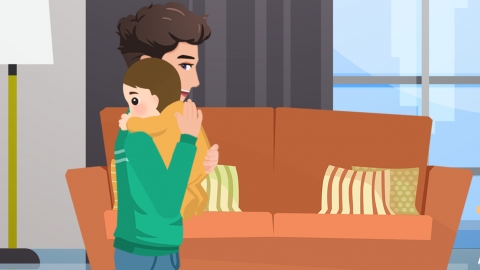What should I do if a one-year-old baby has a cold with a runny nose and cough?
Generally, a one-year-old child experiencing a cold with runny nose and cough may be related to factors such as cold air irritation, decreased immunity, acute rhinitis, acute bronchitis, or pneumonia. Treatment can be general or pharmacological under a doctor's guidance based on the underlying cause. If symptoms persist, prompt medical attention is recommended. Detailed explanations are as follows:

1. Cold Air Irritation
A baby's nasal mucosa is tender and rich in blood vessels. Inadequate warmth protection and exposure to cold air may cause congestion and swelling of the nasal mucosa, leading to the above symptoms. It is important to maintain an appropriate indoor temperature and humidity to prevent the baby from repeatedly inhaling cold air.
2. Decreased Immunity
One-year-olds have relatively weak resistance to pathogens. Infections by viruses or bacteria may cause the above symptoms. It is important to promptly enhance immunity through a nutritious diet and appropriate physical activity to reduce the likelihood of illness.
3. Acute Rhinitis
Acute rhinitis is usually caused by viral infection. When the nasal mucosa is repeatedly irritated by the virus, congestion and swelling occur, increasing secretions and causing symptoms such as runny nose and cough, often accompanied by fever and headache. Treatment may include medications such as ribavirin granules, mometasone furoate nasal spray, and desloratadine oral solution, as directed by a doctor.
4. Acute Bronchitis
Acute bronchitis occurs when inflammation spreads downward. When bronchial mucosa is irritated by inflammation, secretions increase, causing postnasal drip and symptoms such as runny nose and cough. Additionally, wheezing and shortness of breath may occur. It is recommended to use medications such as salbutamol aerosol, ambroxol hydrochloride and clenbuterol oral solution, and amoxicillin-clavulanate potassium granules as prescribed by a doctor.
5. Pneumonia
Pneumonia is an inflammatory condition of the lungs caused by various pathogens. As the condition worsens, respiratory symptoms such as coughing and runny nose may develop. It may also be accompanied by difficulty breathing and lethargy. Treatment may include medications such as azithromycin granules, roxithromycin granules, and children's antitussive syrup, as advised by a doctor.
In addition, in daily life, maintaining a clean and hygienic environment and avoiding allergens can reduce the likelihood of illness. During treatment, regular follow-ups are recommended to adjust the treatment plan as needed.








